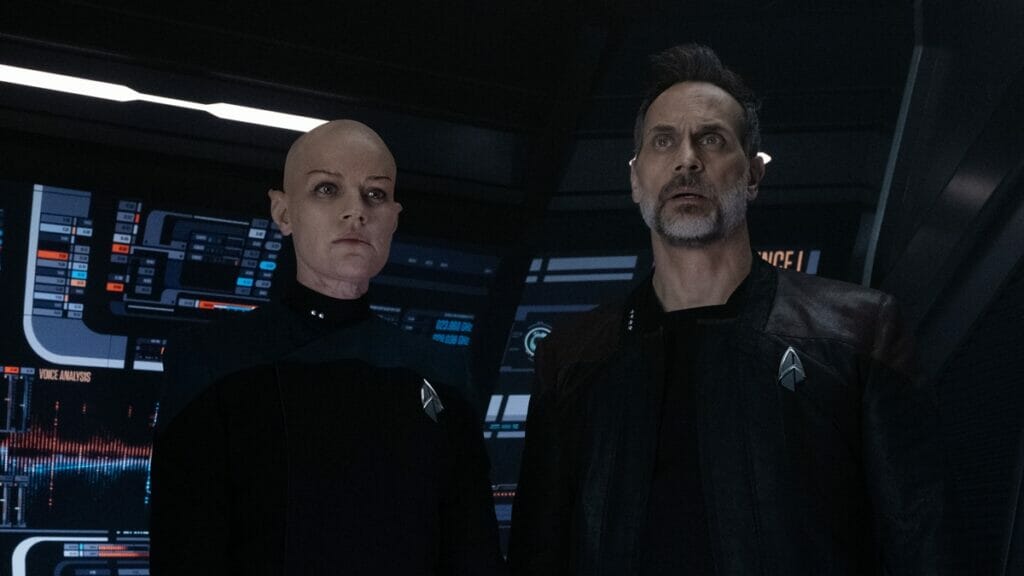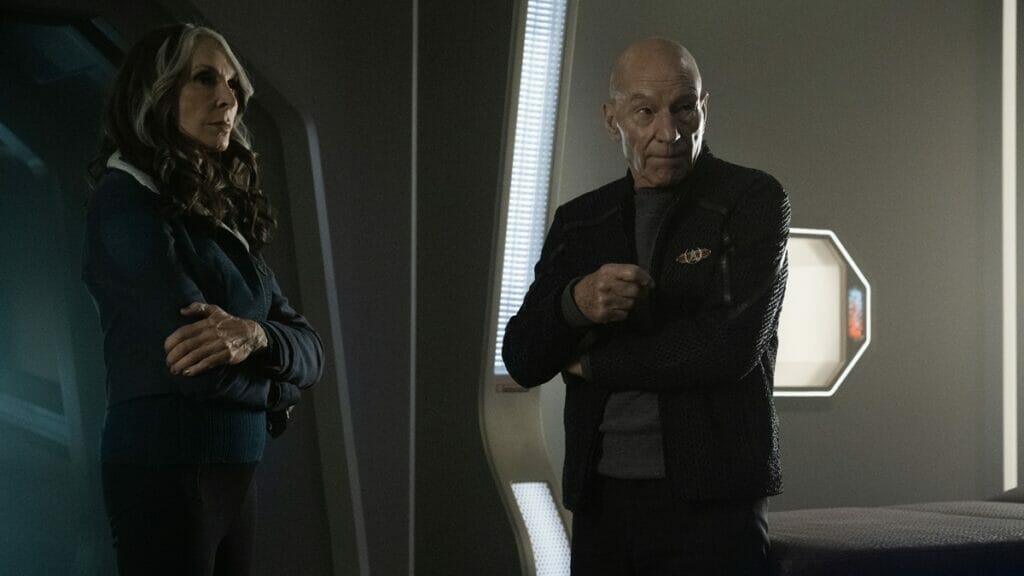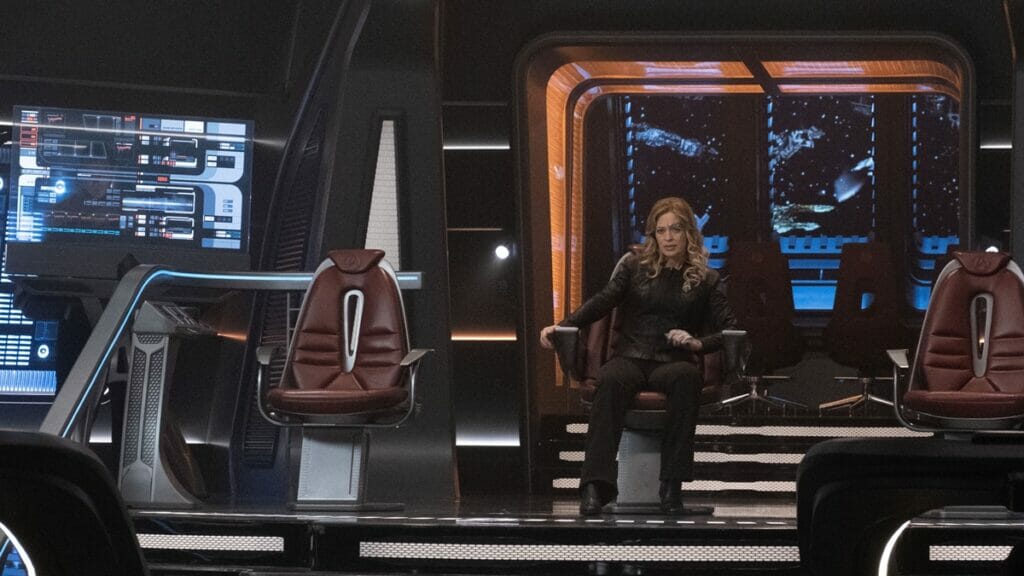A throwback to the moral gray areas of Deep Space Nine raises the skeptical outsiders’ view of Starfleet and its heroes.
Season 3 of Star Trek: Picard is a tribute to the whole of 1990s Star Trek, not just The Next Generation. Case-in-point: the cameo from Tuvok (Tim Russ) of Voyager fame (or at least his Changeling doppelganger). His presence, and the reveal that the rebel faction of shape-shifters is torturing him, add stakes not just for Seven (Jeri Ryan) but also for the audience. The suggestion of another familiar face in distress is a sign that this threat stretches beyond the denizens of the USS Titan, beyond even the old TNG crew, and reaches anyone and every one the fans grew attached to from across the franchise.
But with a title like “Dominion,” this episode, in particular, is an homage to the animating themes of Deep Space Nine. While The Original Series and The Next Generation generally focused more on the utopian view of the Federation and humanity’s future, DS9 was willing to question whether the Federation lived up to the values it championed so loudly. More than that, it was willing to ask whether Starfleet’s sins caused the problems that threatened the “paradise” its officers strove so valiantly to protect.
In that spirit, Star Trek: Picard finally delivers the backstory of Vadic (Amanda Plummer) and her vengeance-seeking shape-shifter faction. Some early dialogue already suggested that her cohort sought revenge on the Federation for the virus it had unleashed on her people to try to annihilate them. Vadic herself decries the move as breaching the bounds of conventional warfare and veering into genocide.

But her grudge is also a more personal one. During the Dominion war, Section 31 also experimented on her and her Changeling siblings. In some haunting and well-edited sequences, we see an operative (played by Plummer, no less) heating test tubes containing the shape-shifters, chipping away at them, and testing their limits in Mengele-like fashion, in the hopes of turning them into the perfect spies for the covert organization. In a bitterly ironic twist, that turns out to be the source of their ability to replicate the solids’ form better than their forebears and the source of Vadic’s utter disdain for all that Starfleet stands for.
It’s a canny choice in an episode whose thematic focus seems to be weighing the good against the bad for an individual, an institution, and an entire civilization. Dr. Crusher (Gates McFadden), in particular, talks about her reluctance to cross the moral lines that are sacrosanct within Starfleet, while Vadic already views her kind as inveterate butchers who must be stopped. Hybrid Data (Brent Spiner) wrestles between the part of his mind filled with his memories of the crew of the Enterprise and the part full of Lore’s chaotic presence. Even Jack (Ed Speleers) is balancing the noble, human part of him against the influence of whatever malign force is calling to him and…uh…giving him psychic powers.
That last part is the weakest element of the episode. “Dominion” features plenty of teases about who and what Jack is. Vadic insinuates that he “isn’t for” Beverly, for instance. But much of it plays like an example of Star Trek: Picard stringing the audience along with yet another tired mystery box. Likewise, Jack’s bond with Sidney La Forge (Ashlei Sharpe Chestnut) has some legs, but their fight with Vadic’s goons is bog standard stuff, and his sudden psychic abilities seem like a bare, clunky setup for later exploits.
In theory, this is all momentous stuff. But, in practice, most of it sounds like a series of essays or announcements.
Maybe the reveal will be worth it. Perhaps, in hindsight, the strained hints about Jack’s affliction will come with greater meaning. But for now, it’s a mere repetition of the same stock symbols (which season 2 of Discovery dabbled in as well) in lieu of something that genuinely moves the needle. It’s a problem with much of “Dominion.” The episode delivers plenty of important information and even some thematic heft. But much of it is done with tin-eared dialogue and clunky explanations that take the audience out of the moment.
We get the rationale for why Vadic’s faction wanted Picard’s remains — because it will allow them to impersonate him and pass through the genetic screenings at Frontier Day. Next, we get hints that Vadic’s weird hand boss is the one who wants Jack, with an agenda seemingly separate from that of the Founders. Finally, we get debates about whether it’s right to target this offshoot Changeling branch in ways that could test the limits of Federation ethics.
In theory, this is all momentous stuff. But, in practice, most of it sounds like a series of essays or announcements to the audience rather than details that pop up organically in natural conversations between real people.

The same sloppiness afflicts the Data-focused portion of the episode. In one of those sudden but inevitable betrayals, the part of Hybrid Data that contains Lore takes over the ship and starts causing trouble. The whole thing is pretty silly. While Spiner can still chew scenery as the evil android, his meta-commentary on the role that agents of chaos like him play, as a thorn in the side of the upstanding Federation, is too on-the-nose and bluntly written. While his taunts serve the episode’s themes, Lore’s shtick comes off the most like pure fanservice in an already homage-filled season.
And yet, a bravura performance from LeVar Burton as Geordi nearly saves it. As trite as the battle of good and evil within Hybrid Data is, there’s power in overcoming it and saving the ship through one of the strongest threads from The Next Generation — the bond between Data and Geordi.
The tears in Geordi’s eyes move you as he talks about how his android best friend made him a better person and how hard it was to lose him, elevating what could otherwise be a doomed subplot. The fact that his pleas are enough to reach the good and noble part of this hybrid lifeform, the part that can recall their friendship and how it helped each of them grow, is a touching way to solve the crisis of the day. (And it laudably calls back to a similar situation in TNG’s “Descent.”)

But in a way, Lore’s critiques are the same as Vadic’s. For all Starfleet luminaries like Picard (Patrick Stewart) sit on their high horses (in some cases literally) and pontificate about the virtues of the Federation, the organization’s past is a checkered one. As much good as the crews of the Enterprise and Deep Space Nine and Voyager have done, they also have plenty of detractors like Shaw, who recognized the collateral damage from their adventures; plenty of skeptics like Lore, who’ve seen the dark side of humanity; and plenty of enemies like Vadic, whose methods are harsh, but whose cause is more righteous than her snarling monologues might suggest.
Sure, it’s convenient to have the Titan crew attempt to sucker her into boarding the ship so they can trap her, and plenty of cheap action ensues. To the same end, Lore’s intervention, which frees Vadic and her ilk to wreak some havoc when our heroes have the upper hand, scans as contrived. And the bad guys taking over the ship is a familiar Star Trek trope (one which Tim Russ himself participated in during The Next Generation), so Vadic’s ominous pose in the captain’s chair doesn’t land with the same oomph it ought to.
Nevertheless, if there’s one commendable thing “Dominion” does, it’s pulling from the series that introduced that title into the Star Trek lexicon to explain why the season’s villain harbors an understandable grudge against the people we usually consider the good guys. As bright and hopeful as the Federation is for so many viewers, like the real-life civilizations it mirrors, it’s committed some grave sins along the journey to live up to its ideals and has plenty to answer for when those hurt by its mistakes return home to pay them back in kind.
Read next: The Spool's Best New Releases
Streaming guides
The Best Live TV Streaming Services With Free Trial
The praises of live TV streaming services don’t need to be further sung. By now, we all know that compared to clunky, commitment-heavy cable, live TV is cheaper and much easier to manage. But just in case you’re still on the fence about jumping over to the other side, or if you’re just unhappy with ... The Best Live TV Streaming Services With Free Trial
How to Watch Power Book III: Raising Kanan Season 3
Season 3 of the hotly anticipated Power spin-off, Power Book III: Raising Kanan, is arriving on Starz soon, so you know what that means: it’s the ’90s again in The Southside, and we’re back with the Thomas family as they navigate the ins and outs of the criminal underworld they’re helping build. Mekai Curtis is ... How to Watch Power Book III: Raising Kanan Season 3
How to Watch Doctor Who: 60th Anniversary Specials
Ladies and gentlemen, we’re so back! To celebrate Doctor Who’s 60th anniversary, the BBC is producing a three-episode special starring none other than the Tenth/Fourteenth Doctor himself, David Tennant. And to the supreme delight of fans (that would be me, dear reader), the Doctor will be joined by old-time companion Donna Noble (Catherine Tate) and ... How to Watch Doctor Who: 60th Anniversary Specials
Which Netflix Country has Interstellar?
Maybe you’ve just seen Oppenheimer and have the strongest urge to marathon—or more fun yet, rank!—all of Christopher Nolan’s films. Or maybe you’re one of the few who haven’t seen Interstellar yet. If you are, then you should change that immediately; the dystopian epic is one of Nolan’s best, and with that incredible twist in ... Which Netflix Country has Interstellar?
Which Netflix Country Has Each Movie of The Hunger Games?
For whatever reason, The Hunger Games series isn’t available in the same countries around the world. You’ll find the first and second (aka the best) installments in Hong Kong, for instance, but not the third and fourth. It’s a frustrating dilemma, especially if you don’t even have a single entry in your region, which is ... Which Netflix Country Has Each Movie of The Hunger Games?
How to Watch ESPN With A Free Trial
One of the major concerns people have before cutting the cord is potentially losing access to live sports. But the great thing about live TV streaming services is that you never lose that access. Minus the contracts and complications of cable, these streaming services connect you to a host of live channels, including ESPN. So ... How to Watch ESPN With A Free Trial
How to Watch Paramount Network With a Free Trial
To date, Paramount Network has only two original shows on air right now: Yellowstone and Bar Rescue. The network seems to have its hands full with on-demand streaming service Paramount+, which is constantly stacked with a fresh supply of new shows. But Yellowstone and Bar Rescue are so sturdy and expansive that the network doesn’t ... How to Watch Paramount Network With a Free Trial
How to Watch WE TV With a Free Trial
Previously “Women’s Entertainment,” We TV has since rebranded to accurately reflect its name and be a more inclusive lifestyle channel. It’s home to addictive reality gems like Bold and Bougie, Bridezillas, Marriage Boot Camp, and The Untold Stories of Hip Hop. And when it’s not airing original titles, it has on syndicated shows like 9-1-1, ... How to Watch WE TV With a Free Trial
How to Watch Comedy Central With a Free Trial
It’s no coincidence that many of today’s biggest comedians found their footing on Comedy Central: the channel is a bastion of emerging comic talents. It served as a playground for people like Nathan Fielder (Fielder For You), Ilana Glazer and Abbi Jacobson (Broad City), Tim Robinson (Detroiters), and Dave Chappelle (Chappelle’s Show) before they shot ... How to Watch Comedy Central With a Free Trial
How to Watch FX With a Free Trial
You’d be hard-pressed to find a bad show airing on FX. The channel has made a name for itself as a bastion of high-brow TV, along with HBO and AMC. It’s produced shows like Atlanta, Fargo, The Americans, Archer, and more recently, Shogun. But because it’s owned by Disney, it still airs several blockbusters in ... How to Watch FX With a Free Trial
How to Watch TNT Sports With A Free Trial
For many sports fans, TNT is a non-negotiable. It broadcasts NBA, MLB, NHL, college basketball, and All Elite Wrestling matches. And, as a bonus, it also has reruns of shows like Supernatural, Charmed, and NCIS, as well as films like The Avengers, Dune, and Justice League. But while TNT used to be a cable staple, ... How to Watch TNT Sports With A Free Trial